Accounting Theory: Oil Spill Regulations and Financial Impacts
VerifiedAdded on 2020/04/01
|10
|1819
|58
Report
AI Summary
This report provides a comprehensive analysis of the financial and regulatory impacts of the Deepwater Horizon oil spill, focusing on the role of accounting theory and public interest. It examines the implications of the spill for BP, including cleanup costs and financial implications, while also assessing the challenges in measuring socio-economic and ecological damages. The report explores the arguments surrounding regulations of oil and gas activities, highlighting the shortcomings in existing frameworks and the need for stricter policies. It also references recent oil spill events, such as the Persian Gulf spill and the Salamina Island incident, to contextualize the broader impacts of such disasters. The conclusion emphasizes the importance of governmental oversight, regulatory bodies, and the need for more stringent enforcement to prevent future incidents and hold responsible parties accountable for environmental damage.
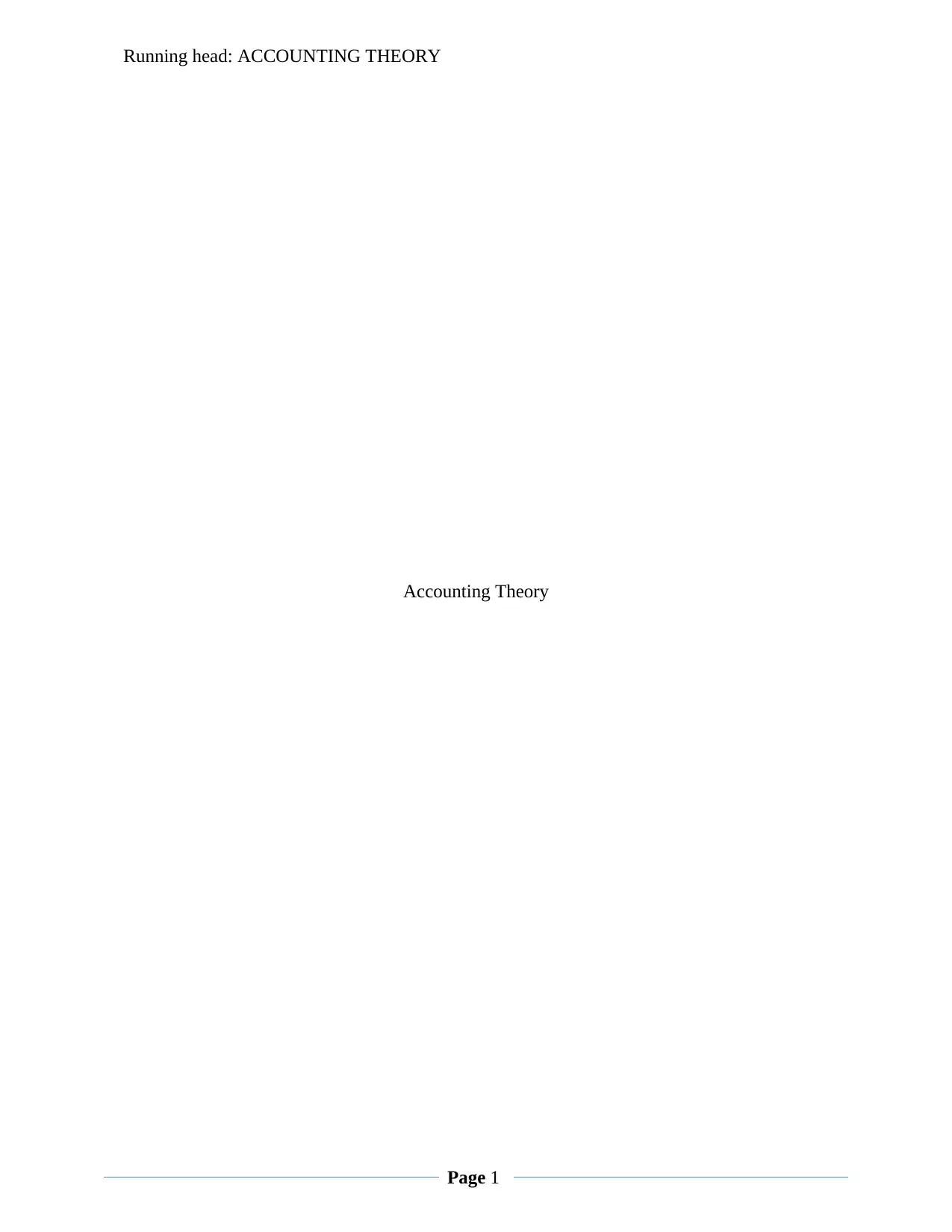
Running head: ACCOUNTING THEORY
Accounting Theory
Page 1
Accounting Theory
Page 1
Paraphrase This Document
Need a fresh take? Get an instant paraphrase of this document with our AI Paraphraser
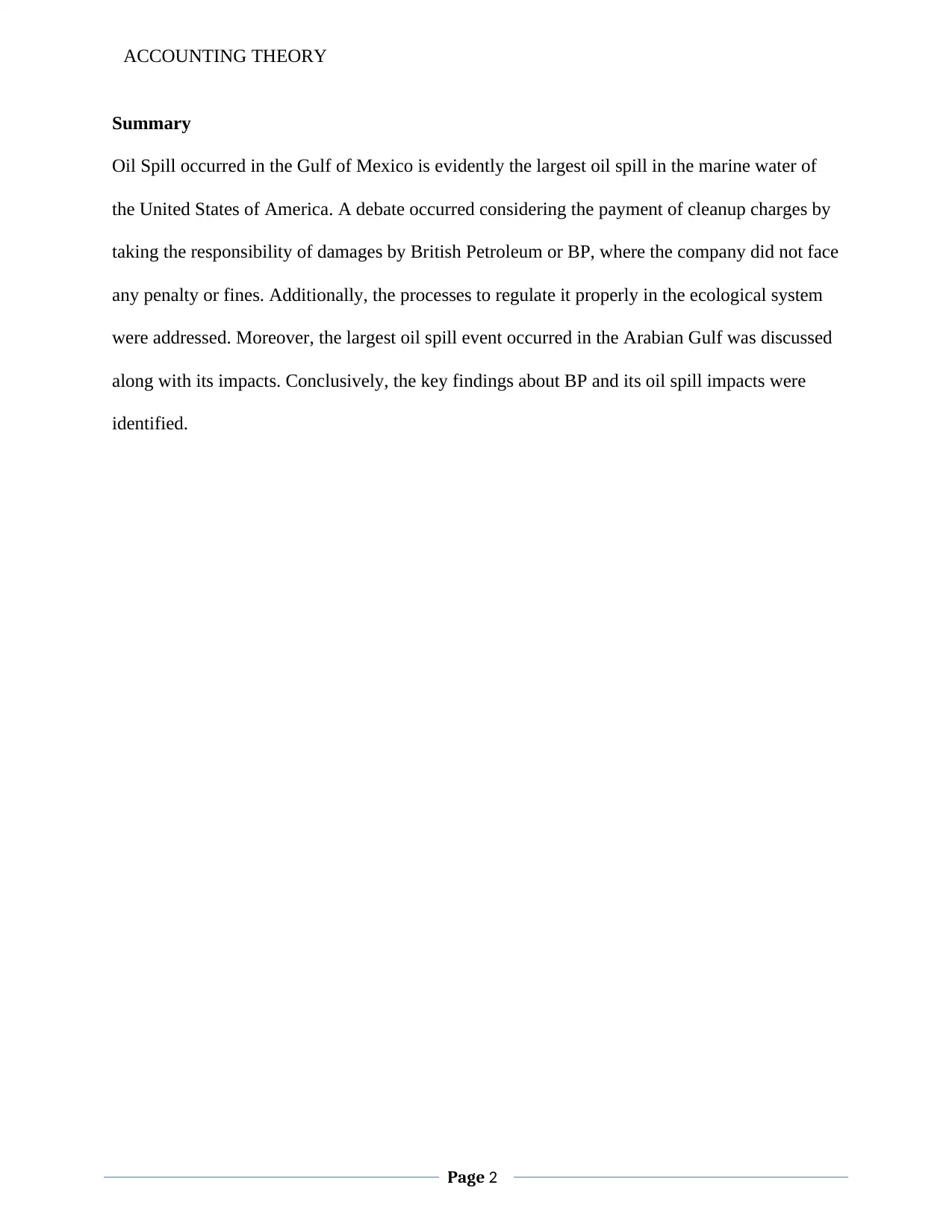
ACCOUNTING THEORY
Summary
Oil Spill occurred in the Gulf of Mexico is evidently the largest oil spill in the marine water of
the United States of America. A debate occurred considering the payment of cleanup charges by
taking the responsibility of damages by British Petroleum or BP, where the company did not face
any penalty or fines. Additionally, the processes to regulate it properly in the ecological system
were addressed. Moreover, the largest oil spill event occurred in the Arabian Gulf was discussed
along with its impacts. Conclusively, the key findings about BP and its oil spill impacts were
identified.
Page 2
Summary
Oil Spill occurred in the Gulf of Mexico is evidently the largest oil spill in the marine water of
the United States of America. A debate occurred considering the payment of cleanup charges by
taking the responsibility of damages by British Petroleum or BP, where the company did not face
any penalty or fines. Additionally, the processes to regulate it properly in the ecological system
were addressed. Moreover, the largest oil spill event occurred in the Arabian Gulf was discussed
along with its impacts. Conclusively, the key findings about BP and its oil spill impacts were
identified.
Page 2
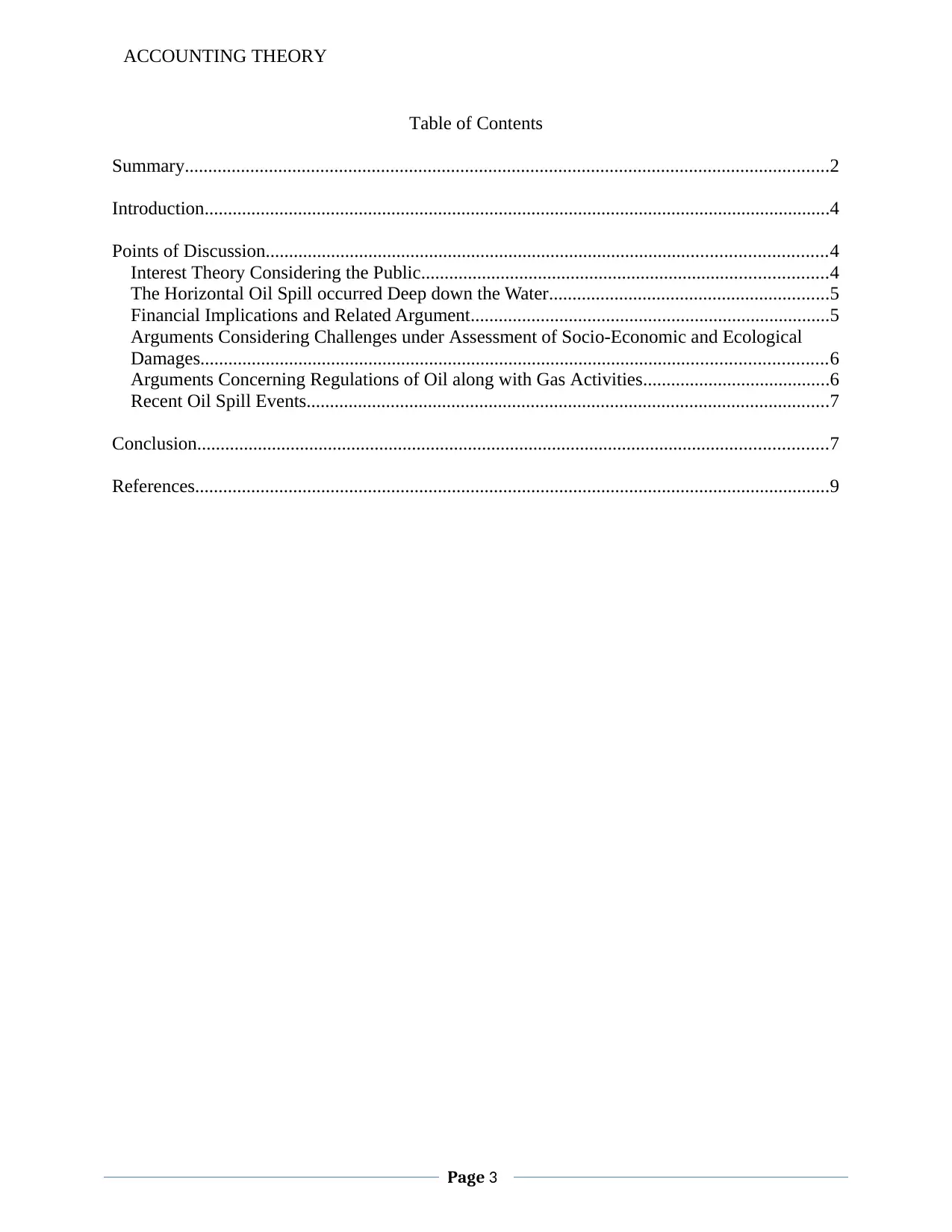
ACCOUNTING THEORY
Table of Contents
Summary..........................................................................................................................................2
Introduction......................................................................................................................................4
Points of Discussion........................................................................................................................4
Interest Theory Considering the Public.......................................................................................4
The Horizontal Oil Spill occurred Deep down the Water............................................................5
Financial Implications and Related Argument.............................................................................5
Arguments Considering Challenges under Assessment of Socio-Economic and Ecological
Damages......................................................................................................................................6
Arguments Concerning Regulations of Oil along with Gas Activities........................................6
Recent Oil Spill Events................................................................................................................7
Conclusion.......................................................................................................................................7
References........................................................................................................................................9
Page 3
Table of Contents
Summary..........................................................................................................................................2
Introduction......................................................................................................................................4
Points of Discussion........................................................................................................................4
Interest Theory Considering the Public.......................................................................................4
The Horizontal Oil Spill occurred Deep down the Water............................................................5
Financial Implications and Related Argument.............................................................................5
Arguments Considering Challenges under Assessment of Socio-Economic and Ecological
Damages......................................................................................................................................6
Arguments Concerning Regulations of Oil along with Gas Activities........................................6
Recent Oil Spill Events................................................................................................................7
Conclusion.......................................................................................................................................7
References........................................................................................................................................9
Page 3
⊘ This is a preview!⊘
Do you want full access?
Subscribe today to unlock all pages.

Trusted by 1+ million students worldwide
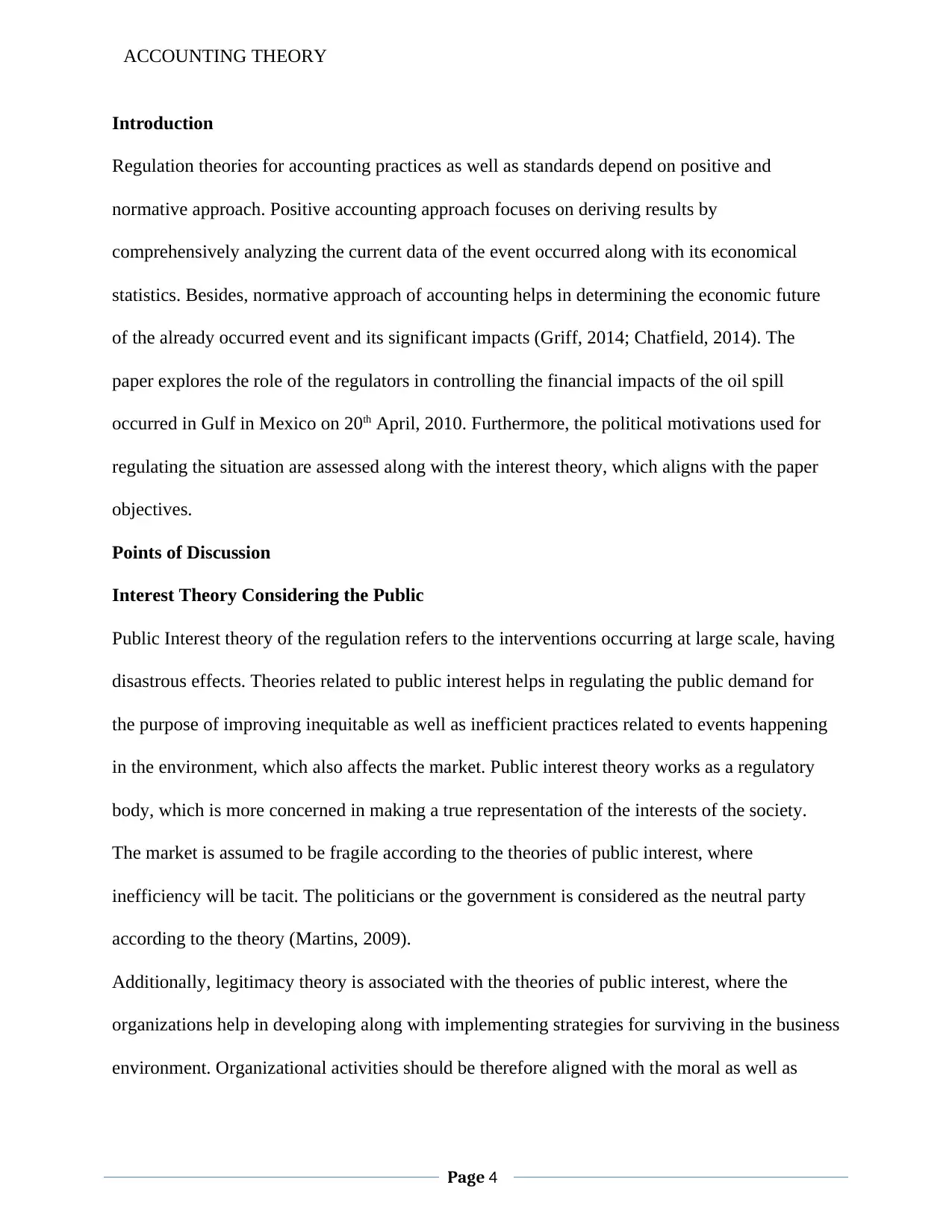
ACCOUNTING THEORY
Introduction
Regulation theories for accounting practices as well as standards depend on positive and
normative approach. Positive accounting approach focuses on deriving results by
comprehensively analyzing the current data of the event occurred along with its economical
statistics. Besides, normative approach of accounting helps in determining the economic future
of the already occurred event and its significant impacts (Griff, 2014; Chatfield, 2014). The
paper explores the role of the regulators in controlling the financial impacts of the oil spill
occurred in Gulf in Mexico on 20th April, 2010. Furthermore, the political motivations used for
regulating the situation are assessed along with the interest theory, which aligns with the paper
objectives.
Points of Discussion
Interest Theory Considering the Public
Public Interest theory of the regulation refers to the interventions occurring at large scale, having
disastrous effects. Theories related to public interest helps in regulating the public demand for
the purpose of improving inequitable as well as inefficient practices related to events happening
in the environment, which also affects the market. Public interest theory works as a regulatory
body, which is more concerned in making a true representation of the interests of the society.
The market is assumed to be fragile according to the theories of public interest, where
inefficiency will be tacit. The politicians or the government is considered as the neutral party
according to the theory (Martins, 2009).
Additionally, legitimacy theory is associated with the theories of public interest, where the
organizations help in developing along with implementing strategies for surviving in the business
environment. Organizational activities should be therefore aligned with the moral as well as
Page 4
Introduction
Regulation theories for accounting practices as well as standards depend on positive and
normative approach. Positive accounting approach focuses on deriving results by
comprehensively analyzing the current data of the event occurred along with its economical
statistics. Besides, normative approach of accounting helps in determining the economic future
of the already occurred event and its significant impacts (Griff, 2014; Chatfield, 2014). The
paper explores the role of the regulators in controlling the financial impacts of the oil spill
occurred in Gulf in Mexico on 20th April, 2010. Furthermore, the political motivations used for
regulating the situation are assessed along with the interest theory, which aligns with the paper
objectives.
Points of Discussion
Interest Theory Considering the Public
Public Interest theory of the regulation refers to the interventions occurring at large scale, having
disastrous effects. Theories related to public interest helps in regulating the public demand for
the purpose of improving inequitable as well as inefficient practices related to events happening
in the environment, which also affects the market. Public interest theory works as a regulatory
body, which is more concerned in making a true representation of the interests of the society.
The market is assumed to be fragile according to the theories of public interest, where
inefficiency will be tacit. The politicians or the government is considered as the neutral party
according to the theory (Martins, 2009).
Additionally, legitimacy theory is associated with the theories of public interest, where the
organizations help in developing along with implementing strategies for surviving in the business
environment. Organizational activities should be therefore aligned with the moral as well as
Page 4
Paraphrase This Document
Need a fresh take? Get an instant paraphrase of this document with our AI Paraphraser
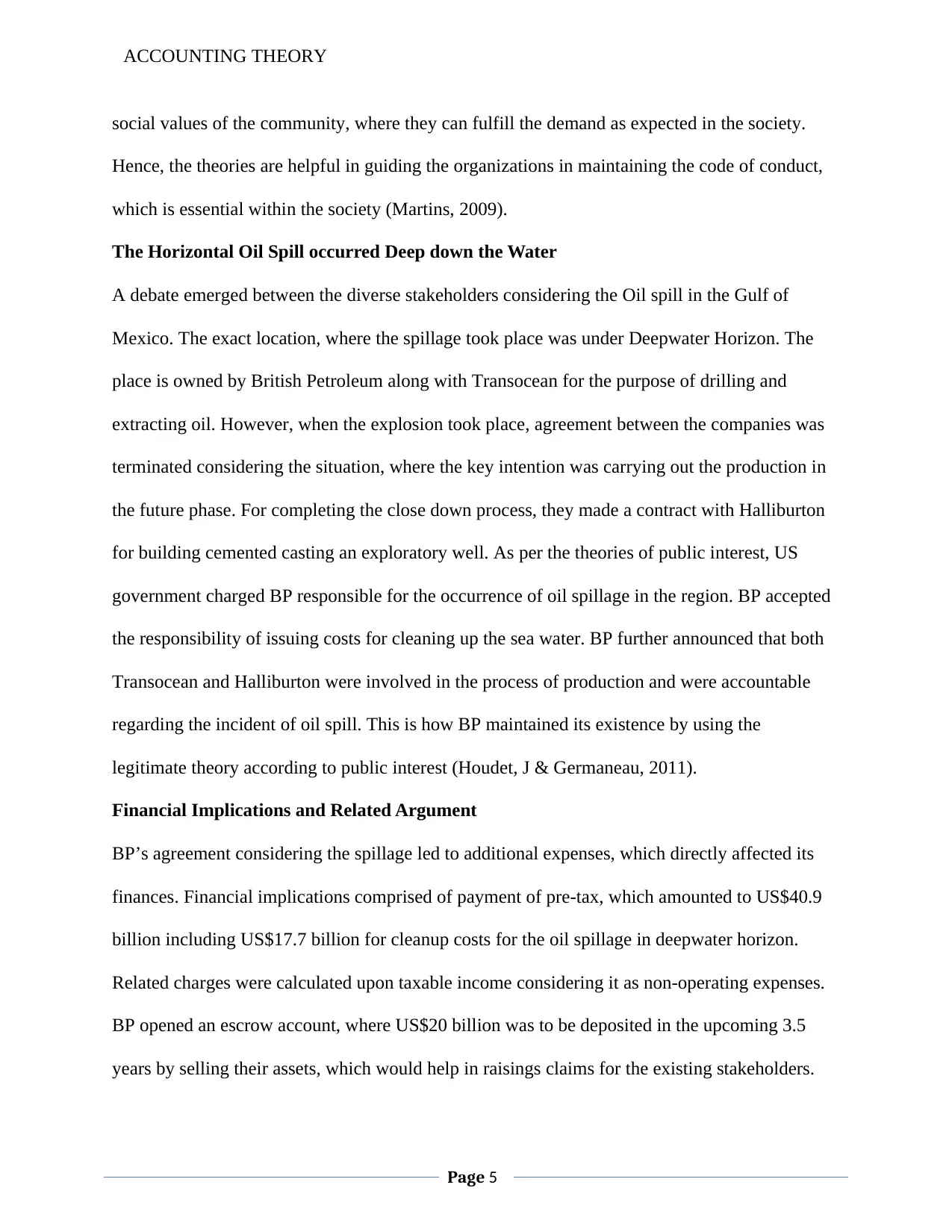
ACCOUNTING THEORY
social values of the community, where they can fulfill the demand as expected in the society.
Hence, the theories are helpful in guiding the organizations in maintaining the code of conduct,
which is essential within the society (Martins, 2009).
The Horizontal Oil Spill occurred Deep down the Water
A debate emerged between the diverse stakeholders considering the Oil spill in the Gulf of
Mexico. The exact location, where the spillage took place was under Deepwater Horizon. The
place is owned by British Petroleum along with Transocean for the purpose of drilling and
extracting oil. However, when the explosion took place, agreement between the companies was
terminated considering the situation, where the key intention was carrying out the production in
the future phase. For completing the close down process, they made a contract with Halliburton
for building cemented casting an exploratory well. As per the theories of public interest, US
government charged BP responsible for the occurrence of oil spillage in the region. BP accepted
the responsibility of issuing costs for cleaning up the sea water. BP further announced that both
Transocean and Halliburton were involved in the process of production and were accountable
regarding the incident of oil spill. This is how BP maintained its existence by using the
legitimate theory according to public interest (Houdet, J & Germaneau, 2011).
Financial Implications and Related Argument
BP’s agreement considering the spillage led to additional expenses, which directly affected its
finances. Financial implications comprised of payment of pre-tax, which amounted to US$40.9
billion including US$17.7 billion for cleanup costs for the oil spillage in deepwater horizon.
Related charges were calculated upon taxable income considering it as non-operating expenses.
BP opened an escrow account, where US$20 billion was to be deposited in the upcoming 3.5
years by selling their assets, which would help in raisings claims for the existing stakeholders.
Page 5
social values of the community, where they can fulfill the demand as expected in the society.
Hence, the theories are helpful in guiding the organizations in maintaining the code of conduct,
which is essential within the society (Martins, 2009).
The Horizontal Oil Spill occurred Deep down the Water
A debate emerged between the diverse stakeholders considering the Oil spill in the Gulf of
Mexico. The exact location, where the spillage took place was under Deepwater Horizon. The
place is owned by British Petroleum along with Transocean for the purpose of drilling and
extracting oil. However, when the explosion took place, agreement between the companies was
terminated considering the situation, where the key intention was carrying out the production in
the future phase. For completing the close down process, they made a contract with Halliburton
for building cemented casting an exploratory well. As per the theories of public interest, US
government charged BP responsible for the occurrence of oil spillage in the region. BP accepted
the responsibility of issuing costs for cleaning up the sea water. BP further announced that both
Transocean and Halliburton were involved in the process of production and were accountable
regarding the incident of oil spill. This is how BP maintained its existence by using the
legitimate theory according to public interest (Houdet, J & Germaneau, 2011).
Financial Implications and Related Argument
BP’s agreement considering the spillage led to additional expenses, which directly affected its
finances. Financial implications comprised of payment of pre-tax, which amounted to US$40.9
billion including US$17.7 billion for cleanup costs for the oil spillage in deepwater horizon.
Related charges were calculated upon taxable income considering it as non-operating expenses.
BP opened an escrow account, where US$20 billion was to be deposited in the upcoming 3.5
years by selling their assets, which would help in raisings claims for the existing stakeholders.
Page 5
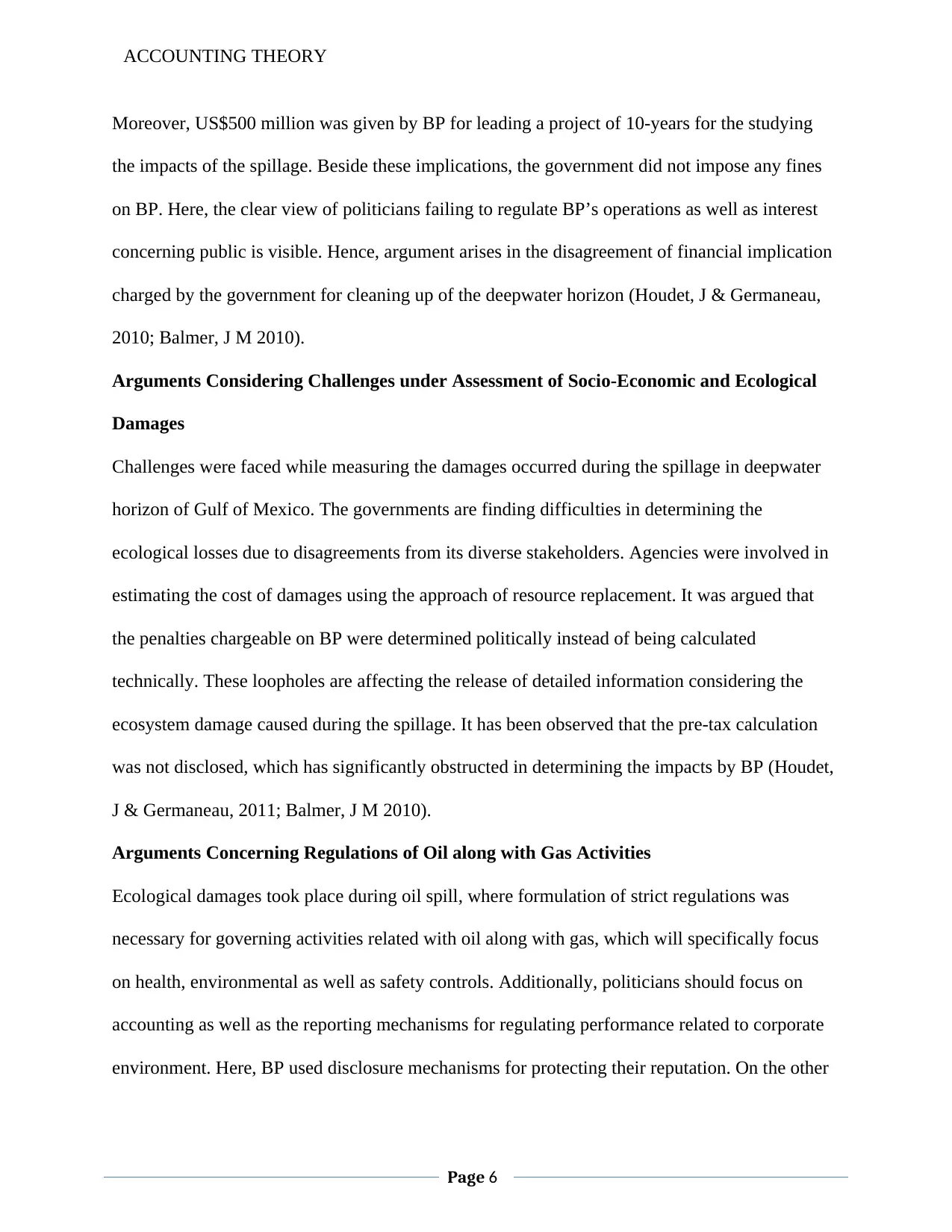
ACCOUNTING THEORY
Moreover, US$500 million was given by BP for leading a project of 10-years for the studying
the impacts of the spillage. Beside these implications, the government did not impose any fines
on BP. Here, the clear view of politicians failing to regulate BP’s operations as well as interest
concerning public is visible. Hence, argument arises in the disagreement of financial implication
charged by the government for cleaning up of the deepwater horizon (Houdet, J & Germaneau,
2010; Balmer, J M 2010).
Arguments Considering Challenges under Assessment of Socio-Economic and Ecological
Damages
Challenges were faced while measuring the damages occurred during the spillage in deepwater
horizon of Gulf of Mexico. The governments are finding difficulties in determining the
ecological losses due to disagreements from its diverse stakeholders. Agencies were involved in
estimating the cost of damages using the approach of resource replacement. It was argued that
the penalties chargeable on BP were determined politically instead of being calculated
technically. These loopholes are affecting the release of detailed information considering the
ecosystem damage caused during the spillage. It has been observed that the pre-tax calculation
was not disclosed, which has significantly obstructed in determining the impacts by BP (Houdet,
J & Germaneau, 2011; Balmer, J M 2010).
Arguments Concerning Regulations of Oil along with Gas Activities
Ecological damages took place during oil spill, where formulation of strict regulations was
necessary for governing activities related with oil along with gas, which will specifically focus
on health, environmental as well as safety controls. Additionally, politicians should focus on
accounting as well as the reporting mechanisms for regulating performance related to corporate
environment. Here, BP used disclosure mechanisms for protecting their reputation. On the other
Page 6
Moreover, US$500 million was given by BP for leading a project of 10-years for the studying
the impacts of the spillage. Beside these implications, the government did not impose any fines
on BP. Here, the clear view of politicians failing to regulate BP’s operations as well as interest
concerning public is visible. Hence, argument arises in the disagreement of financial implication
charged by the government for cleaning up of the deepwater horizon (Houdet, J & Germaneau,
2010; Balmer, J M 2010).
Arguments Considering Challenges under Assessment of Socio-Economic and Ecological
Damages
Challenges were faced while measuring the damages occurred during the spillage in deepwater
horizon of Gulf of Mexico. The governments are finding difficulties in determining the
ecological losses due to disagreements from its diverse stakeholders. Agencies were involved in
estimating the cost of damages using the approach of resource replacement. It was argued that
the penalties chargeable on BP were determined politically instead of being calculated
technically. These loopholes are affecting the release of detailed information considering the
ecosystem damage caused during the spillage. It has been observed that the pre-tax calculation
was not disclosed, which has significantly obstructed in determining the impacts by BP (Houdet,
J & Germaneau, 2011; Balmer, J M 2010).
Arguments Concerning Regulations of Oil along with Gas Activities
Ecological damages took place during oil spill, where formulation of strict regulations was
necessary for governing activities related with oil along with gas, which will specifically focus
on health, environmental as well as safety controls. Additionally, politicians should focus on
accounting as well as the reporting mechanisms for regulating performance related to corporate
environment. Here, BP used disclosure mechanisms for protecting their reputation. On the other
Page 6
⊘ This is a preview!⊘
Do you want full access?
Subscribe today to unlock all pages.

Trusted by 1+ million students worldwide
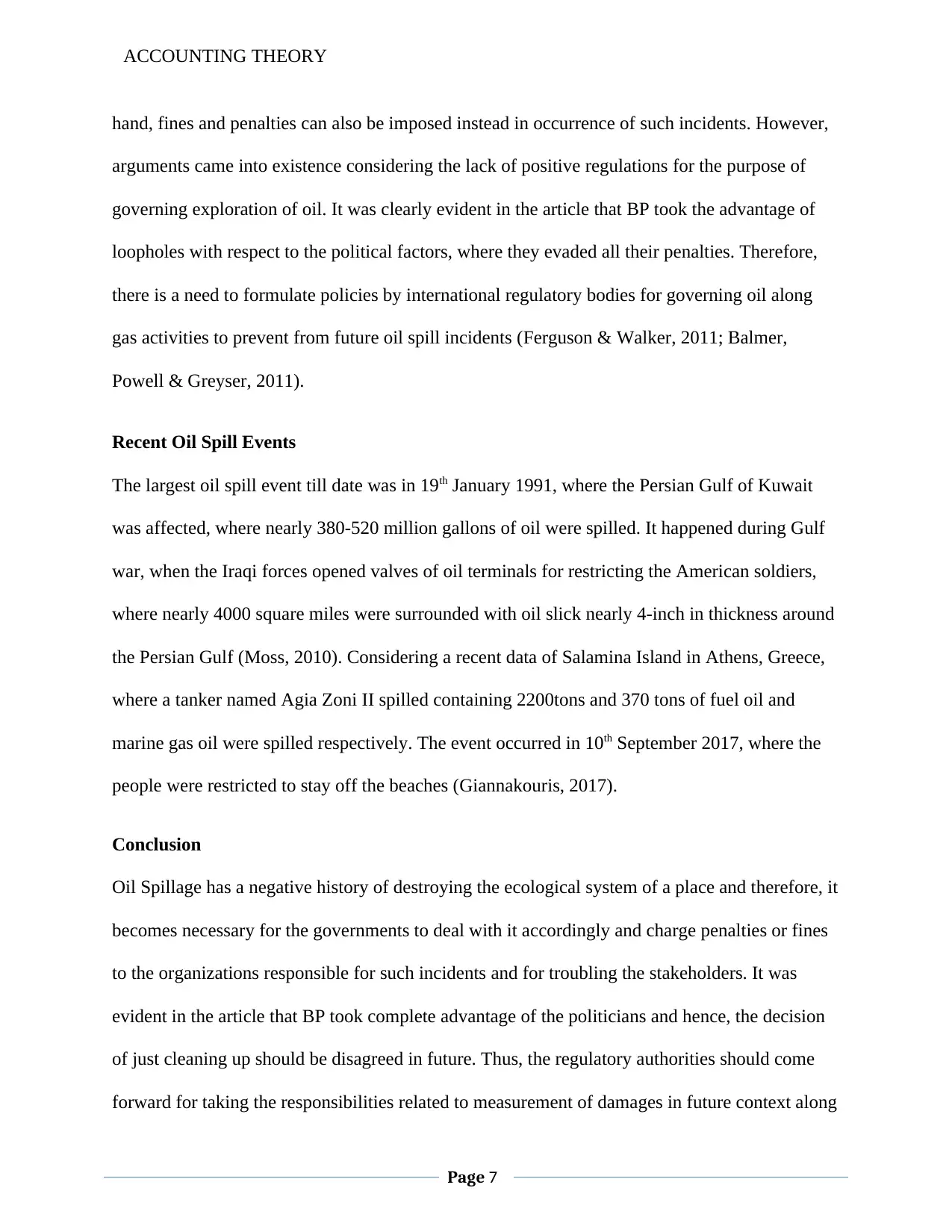
ACCOUNTING THEORY
hand, fines and penalties can also be imposed instead in occurrence of such incidents. However,
arguments came into existence considering the lack of positive regulations for the purpose of
governing exploration of oil. It was clearly evident in the article that BP took the advantage of
loopholes with respect to the political factors, where they evaded all their penalties. Therefore,
there is a need to formulate policies by international regulatory bodies for governing oil along
gas activities to prevent from future oil spill incidents (Ferguson & Walker, 2011; Balmer,
Powell & Greyser, 2011).
Recent Oil Spill Events
The largest oil spill event till date was in 19th January 1991, where the Persian Gulf of Kuwait
was affected, where nearly 380-520 million gallons of oil were spilled. It happened during Gulf
war, when the Iraqi forces opened valves of oil terminals for restricting the American soldiers,
where nearly 4000 square miles were surrounded with oil slick nearly 4-inch in thickness around
the Persian Gulf (Moss, 2010). Considering a recent data of Salamina Island in Athens, Greece,
where a tanker named Agia Zoni II spilled containing 2200tons and 370 tons of fuel oil and
marine gas oil were spilled respectively. The event occurred in 10th September 2017, where the
people were restricted to stay off the beaches (Giannakouris, 2017).
Conclusion
Oil Spillage has a negative history of destroying the ecological system of a place and therefore, it
becomes necessary for the governments to deal with it accordingly and charge penalties or fines
to the organizations responsible for such incidents and for troubling the stakeholders. It was
evident in the article that BP took complete advantage of the politicians and hence, the decision
of just cleaning up should be disagreed in future. Thus, the regulatory authorities should come
forward for taking the responsibilities related to measurement of damages in future context along
Page 7
hand, fines and penalties can also be imposed instead in occurrence of such incidents. However,
arguments came into existence considering the lack of positive regulations for the purpose of
governing exploration of oil. It was clearly evident in the article that BP took the advantage of
loopholes with respect to the political factors, where they evaded all their penalties. Therefore,
there is a need to formulate policies by international regulatory bodies for governing oil along
gas activities to prevent from future oil spill incidents (Ferguson & Walker, 2011; Balmer,
Powell & Greyser, 2011).
Recent Oil Spill Events
The largest oil spill event till date was in 19th January 1991, where the Persian Gulf of Kuwait
was affected, where nearly 380-520 million gallons of oil were spilled. It happened during Gulf
war, when the Iraqi forces opened valves of oil terminals for restricting the American soldiers,
where nearly 4000 square miles were surrounded with oil slick nearly 4-inch in thickness around
the Persian Gulf (Moss, 2010). Considering a recent data of Salamina Island in Athens, Greece,
where a tanker named Agia Zoni II spilled containing 2200tons and 370 tons of fuel oil and
marine gas oil were spilled respectively. The event occurred in 10th September 2017, where the
people were restricted to stay off the beaches (Giannakouris, 2017).
Conclusion
Oil Spillage has a negative history of destroying the ecological system of a place and therefore, it
becomes necessary for the governments to deal with it accordingly and charge penalties or fines
to the organizations responsible for such incidents and for troubling the stakeholders. It was
evident in the article that BP took complete advantage of the politicians and hence, the decision
of just cleaning up should be disagreed in future. Thus, the regulatory authorities should come
forward for taking the responsibilities related to measurement of damages in future context along
Page 7
Paraphrase This Document
Need a fresh take? Get an instant paraphrase of this document with our AI Paraphraser
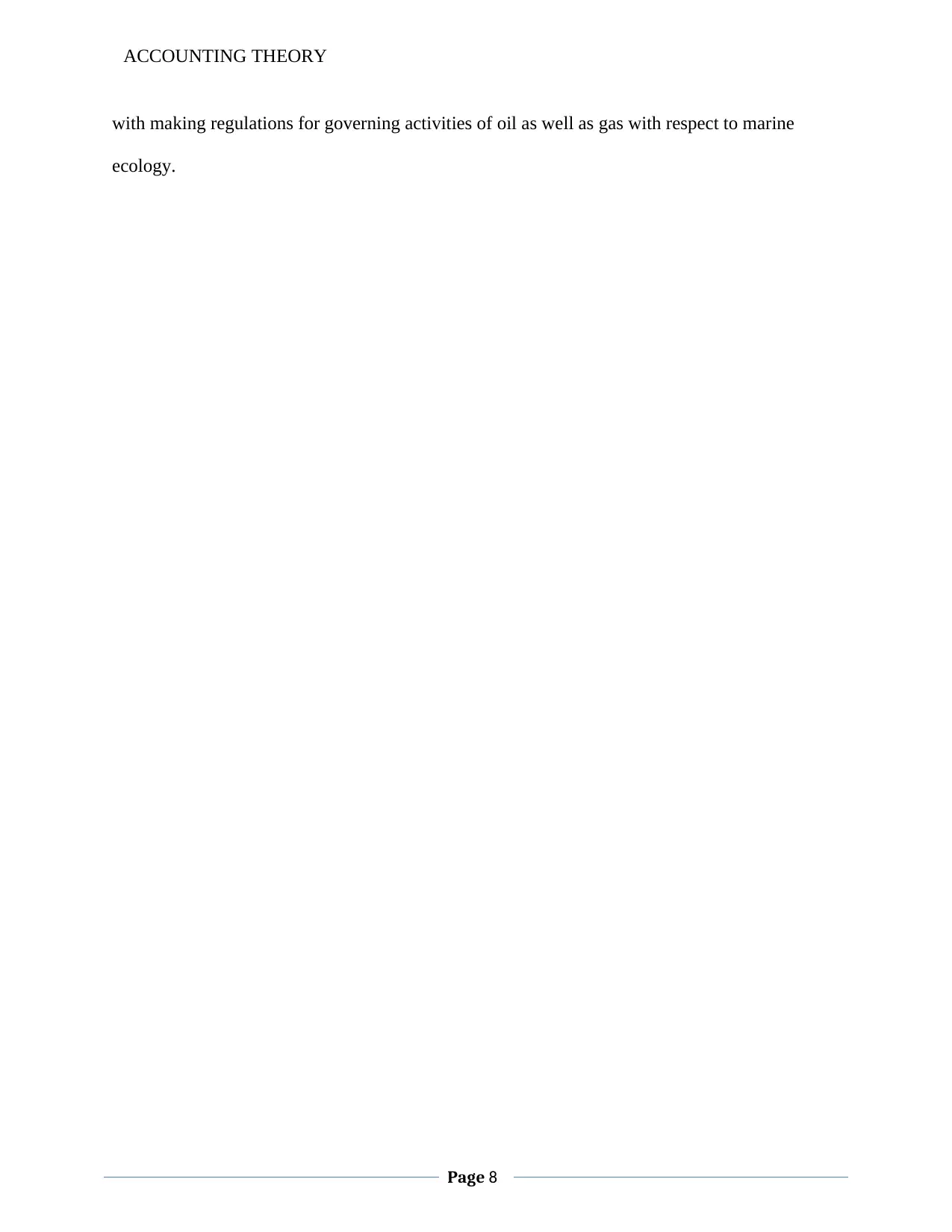
ACCOUNTING THEORY
with making regulations for governing activities of oil as well as gas with respect to marine
ecology.
Page 8
with making regulations for governing activities of oil as well as gas with respect to marine
ecology.
Page 8
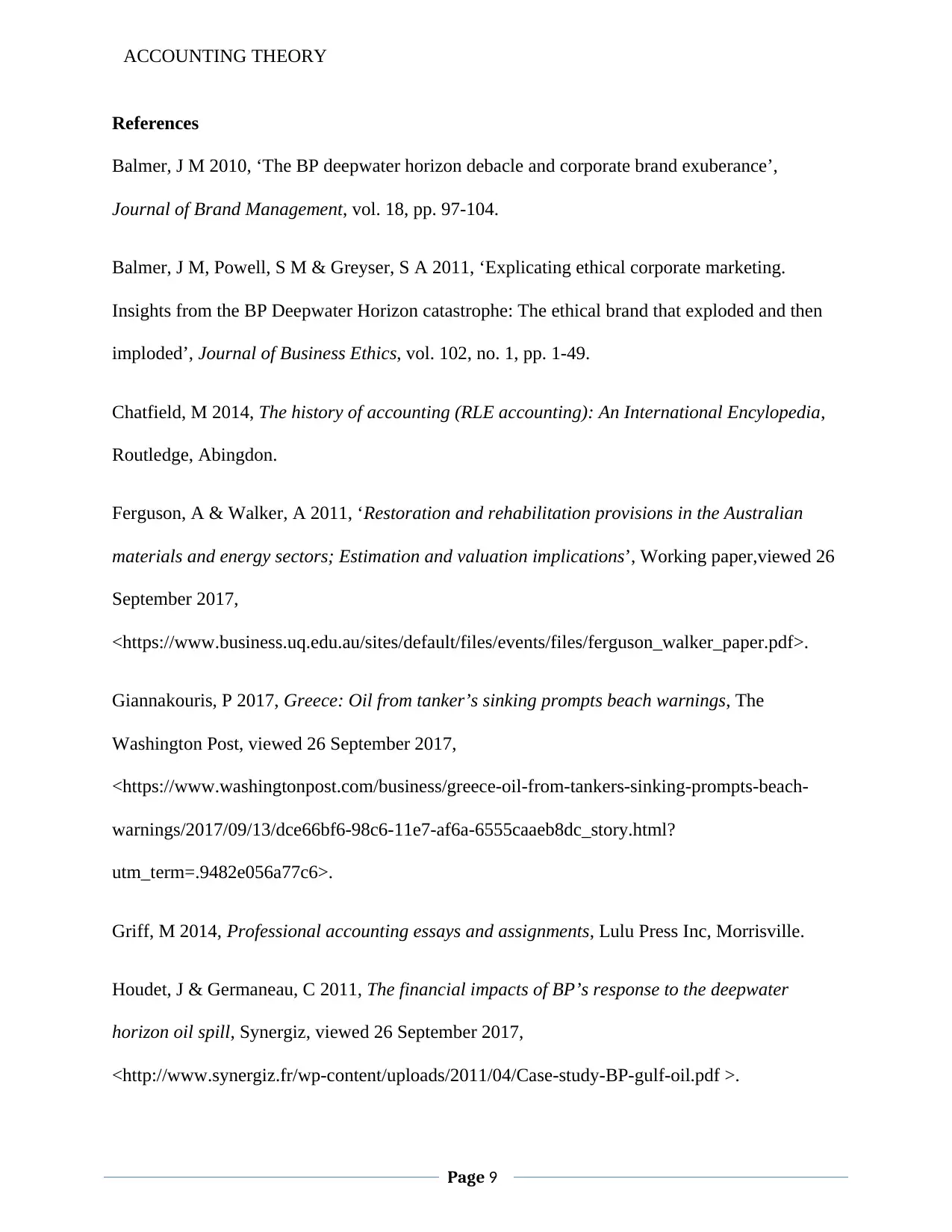
ACCOUNTING THEORY
References
Balmer, J M 2010, ‘The BP deepwater horizon debacle and corporate brand exuberance’,
Journal of Brand Management, vol. 18, pp. 97-104.
Balmer, J M, Powell, S M & Greyser, S A 2011, ‘Explicating ethical corporate marketing.
Insights from the BP Deepwater Horizon catastrophe: The ethical brand that exploded and then
imploded’, Journal of Business Ethics, vol. 102, no. 1, pp. 1-49.
Chatfield, M 2014, The history of accounting (RLE accounting): An International Encylopedia,
Routledge, Abingdon.
Ferguson, A & Walker, A 2011, ‘Restoration and rehabilitation provisions in the Australian
materials and energy sectors; Estimation and valuation implications’, Working paper,viewed 26
September 2017,
<https://www.business.uq.edu.au/sites/default/files/events/files/ferguson_walker_paper.pdf>.
Giannakouris, P 2017, Greece: Oil from tanker’s sinking prompts beach warnings, The
Washington Post, viewed 26 September 2017,
<https://www.washingtonpost.com/business/greece-oil-from-tankers-sinking-prompts-beach-
warnings/2017/09/13/dce66bf6-98c6-11e7-af6a-6555caaeb8dc_story.html?
utm_term=.9482e056a77c6>.
Griff, M 2014, Professional accounting essays and assignments, Lulu Press Inc, Morrisville.
Houdet, J & Germaneau, C 2011, The financial impacts of BP’s response to the deepwater
horizon oil spill, Synergiz, viewed 26 September 2017,
<http://www.synergiz.fr/wp-content/uploads/2011/04/Case-study-BP-gulf-oil.pdf >.
Page 9
References
Balmer, J M 2010, ‘The BP deepwater horizon debacle and corporate brand exuberance’,
Journal of Brand Management, vol. 18, pp. 97-104.
Balmer, J M, Powell, S M & Greyser, S A 2011, ‘Explicating ethical corporate marketing.
Insights from the BP Deepwater Horizon catastrophe: The ethical brand that exploded and then
imploded’, Journal of Business Ethics, vol. 102, no. 1, pp. 1-49.
Chatfield, M 2014, The history of accounting (RLE accounting): An International Encylopedia,
Routledge, Abingdon.
Ferguson, A & Walker, A 2011, ‘Restoration and rehabilitation provisions in the Australian
materials and energy sectors; Estimation and valuation implications’, Working paper,viewed 26
September 2017,
<https://www.business.uq.edu.au/sites/default/files/events/files/ferguson_walker_paper.pdf>.
Giannakouris, P 2017, Greece: Oil from tanker’s sinking prompts beach warnings, The
Washington Post, viewed 26 September 2017,
<https://www.washingtonpost.com/business/greece-oil-from-tankers-sinking-prompts-beach-
warnings/2017/09/13/dce66bf6-98c6-11e7-af6a-6555caaeb8dc_story.html?
utm_term=.9482e056a77c6>.
Griff, M 2014, Professional accounting essays and assignments, Lulu Press Inc, Morrisville.
Houdet, J & Germaneau, C 2011, The financial impacts of BP’s response to the deepwater
horizon oil spill, Synergiz, viewed 26 September 2017,
<http://www.synergiz.fr/wp-content/uploads/2011/04/Case-study-BP-gulf-oil.pdf >.
Page 9
⊘ This is a preview!⊘
Do you want full access?
Subscribe today to unlock all pages.

Trusted by 1+ million students worldwide
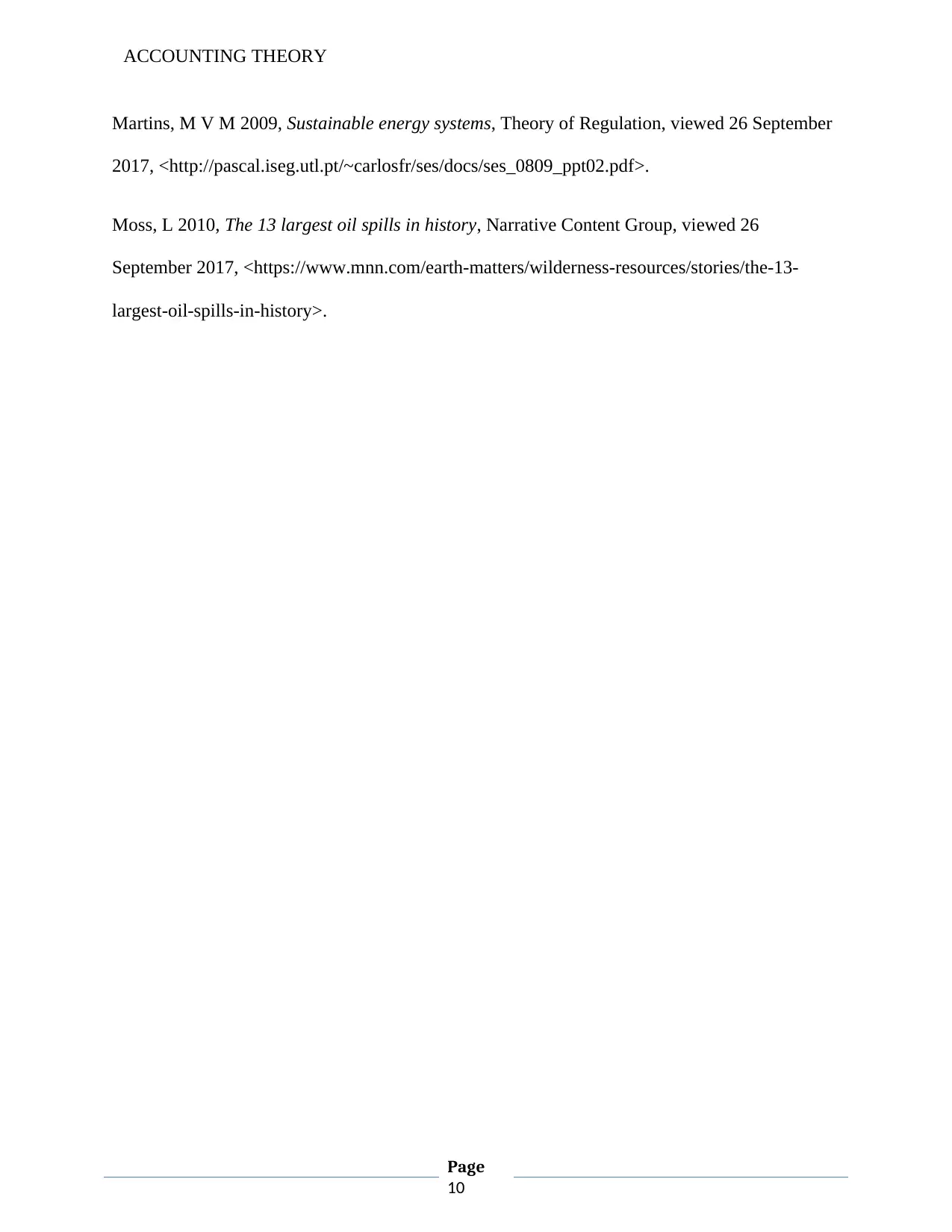
ACCOUNTING THEORY
Martins, M V M 2009, Sustainable energy systems, Theory of Regulation, viewed 26 September
2017, <http://pascal.iseg.utl.pt/~carlosfr/ses/docs/ses_0809_ppt02.pdf>.
Moss, L 2010, The 13 largest oil spills in history, Narrative Content Group, viewed 26
September 2017, <https://www.mnn.com/earth-matters/wilderness-resources/stories/the-13-
largest-oil-spills-in-history>.
Page
10
Martins, M V M 2009, Sustainable energy systems, Theory of Regulation, viewed 26 September
2017, <http://pascal.iseg.utl.pt/~carlosfr/ses/docs/ses_0809_ppt02.pdf>.
Moss, L 2010, The 13 largest oil spills in history, Narrative Content Group, viewed 26
September 2017, <https://www.mnn.com/earth-matters/wilderness-resources/stories/the-13-
largest-oil-spills-in-history>.
Page
10
1 out of 10
Related Documents
Your All-in-One AI-Powered Toolkit for Academic Success.
+13062052269
info@desklib.com
Available 24*7 on WhatsApp / Email
![[object Object]](/_next/static/media/star-bottom.7253800d.svg)
Unlock your academic potential
Copyright © 2020–2026 A2Z Services. All Rights Reserved. Developed and managed by ZUCOL.





